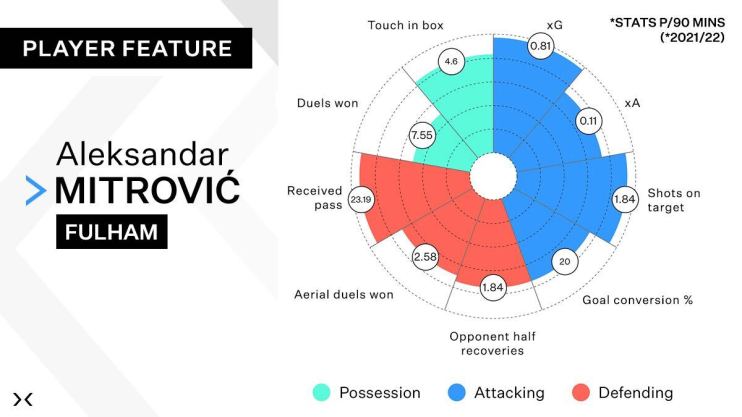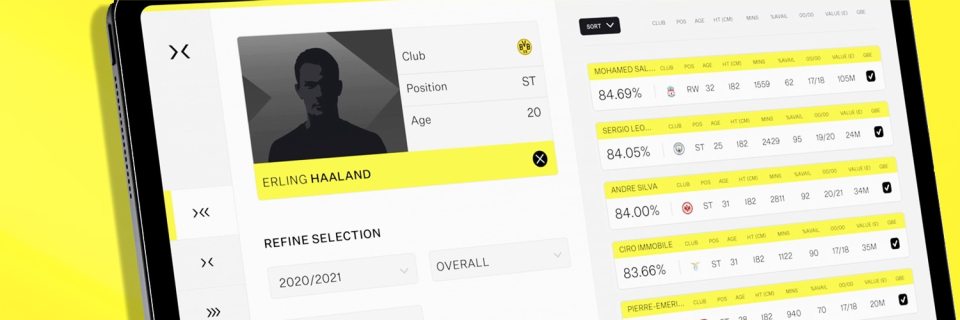Delphlyx: The start-up offering football bosses data analytics for dummies

From Harvard graduates building bespoke programmes for Liverpool to the video analysis tools now available even to Sunday league coaches, 21st century football is awash with data.
But what might have been overlooked is that some are drowning in it; while today’s club analysts and scouts may be data-literate, their older superiors frequently are not.
Enter London-based entrepreneur Tom Randolph, who has created Delphlyx, a software platform designed to help the executives who actually have the final say on signings to do their own identification, comparison and valuation of footballers.
“There’s all this data but decision makers don’t know how to digest it and then use it,” said Randolph, 27, whose investors include Champions League players.
“A lot of the other data companies are made by data people for data people, so they’re very good at going into incredible depth. But actually, at the top level, they don’t have that background.”
Randolph says Delphlyx was devised with the aim that “a 55-year-old, non-data-driven sporting director is able to use it within seconds”.
“I’d like it to become the go-to tool for all decision makers in football,” he adds.
The platform, which launched this summer and costs from £400 per month, allows users to search for players by profile or attributes in 35 leagues around the world.
“It’s useful at the beginning of the scouting process and at the end,” says Randolph.
“It makes your job 10 times easier and makes you 10 times quicker at everything. At the end of the day, the name of the game is to be quicker than the others at finding these people.”
How Delphlyx can overcome bias in football recruitment
Randolph believes Delphlyx can help to overcome one of the biggest barriers to signing the right players: deeply subjective, irrational judgements.
He spent two years working in the Premier League at Huddersfield Town and saw first-hand how executives would make snap decisions based on a player’s identity or representation.
“I could see as soon as the player name was on there they would make up their mind, positive or negative,” he says.
“Within seconds they’d say ‘I know his agent, yeah I hate him’. And I’d say ‘Well the data is saying something else and he could be quite good for us’.”
Scouts and analysts, he says, can tend to look more favourably on certain types of players, such as tough-tackling midfielders, meaning that dozens of other potential recruits never get recommended up the chain.
Delphlyx can help to counter bias with its anonymous mode, which removes names to allow users to identify and compare players on their profiles alone.
Randolph had an unconventional route into football. While studying Italian at Leeds University he was tapped up to be an interpreter for Southampton FC, who had just signed striker Manolo Gabbiadini from Napoli.

He declined in order to finish his degree but was recommended to Huddersfield, who needed a multilingual player liaison officer to help explain team instructions and contract negotiations to its increasingly multicultural squad.
A keen student of the game, he ended up helping in other areas, including recruitment, which led to his realisation that there is a gap in the market for a tool that makes data analytics accessible for the layperson.
“Not having a data background enabled me to make a platform for me. So if I can understand it, they can understand it,” he says.
“Whereas others are made by incredible geniuses but lack maybe the understanding of how it translates into something I can use.
“People buy them and log on but then don’t really know how to use them and then pay really high consultancy fees to get the information. Ours, we give it to you and don’t really want to hear from you again.”
Getting a head start in a post-Brexit transfer market
After around six months in development Randolph launched Delphlyx in August, aimed at small and medium sized clubs, which he says equates to mid-table Premier League teams and below, and anyone outside of the top four in Europe’s other major competitions.
The pricing is transparent: £400 per month for a standard subscription and £800 per month for the pro version, which includes additional features such as valuations. “It doesn’t change if you’re Man United or Macclesfield,” he says.
The platform is also pitched at agents, who can use its insights in transfer or contract negotiations with clubs. Just a few weeks in, it already has four clients, and is aiming for 15 by Christmas. Once it has 20-30 it will break even, meaning profitability is not the distant theoretical possibility of some start-ups.
Delphlyx can also help those in the football industry navigate the post-Brexit transfer landscape.

Since leaving the EU it has become easier to obtain work permits for players from further afield, for instance in Latin America. The platform can help to identify a shortlist of players in those markets which can then be singled out for live scouting without the need for a wide-ranging operation that is out of reach to all but the biggest clubs.
“You’re able to go with questions instead of saying [to a South America-based scout] ‘can you just watch a few games for us and tell us anyone interesting?’,” he says. “Because you’re always going to be last to the party. Man City have got scouts everywhere. They are going to find players before you.”
The pro version of Delphlyx – which takes its name from Delphi, the oracle in Greek mythology, and Netflix, with which it loosely shares a disruptive digital mission – even includes a tool for calculating whether targets meet the new immigration criteria for footballers moving to the UK.
Delphlyx designed to help not replace scouts and analysts
Randolph says his creation is not intended to undermine scouts or data analysts but to help them by cutting out hours of labour-intensive and often fruitless watching of matches.
“If you go back to [seminal sports data analytics movement] Moneyball, the initial fear from all the old-school scouts was that this was going to replace them,” he says.
“And yes, when you automate certain things you are going to replace people. But not all of them. The ones who are able to get on board with it are the ones who are able to move faster and be more efficient and therefore do their job better.”
Randolph’s hope is that, once established, Delphlyx could be enhanced to allow verified clubs and individuals to contact each other through the platform. The feature would, he says, help solve another of football’s problems: chancers trying to insert themselves into deals.
He has little desire to return to a role at a club, despite long dreaming of becoming a sporting director himself.
“In football you don’t really live,” he says. “It’s a LinkedIn job: it looks good for your friends and family but in essence you don’t really see anyone, you miss birthdays, holidays. Because when the team is playing you’re there, come what may. It’s a nomadic lifestyle.
“Football is so emotional, shooting from the hip. It would need to be something quite special to go back to that.”
